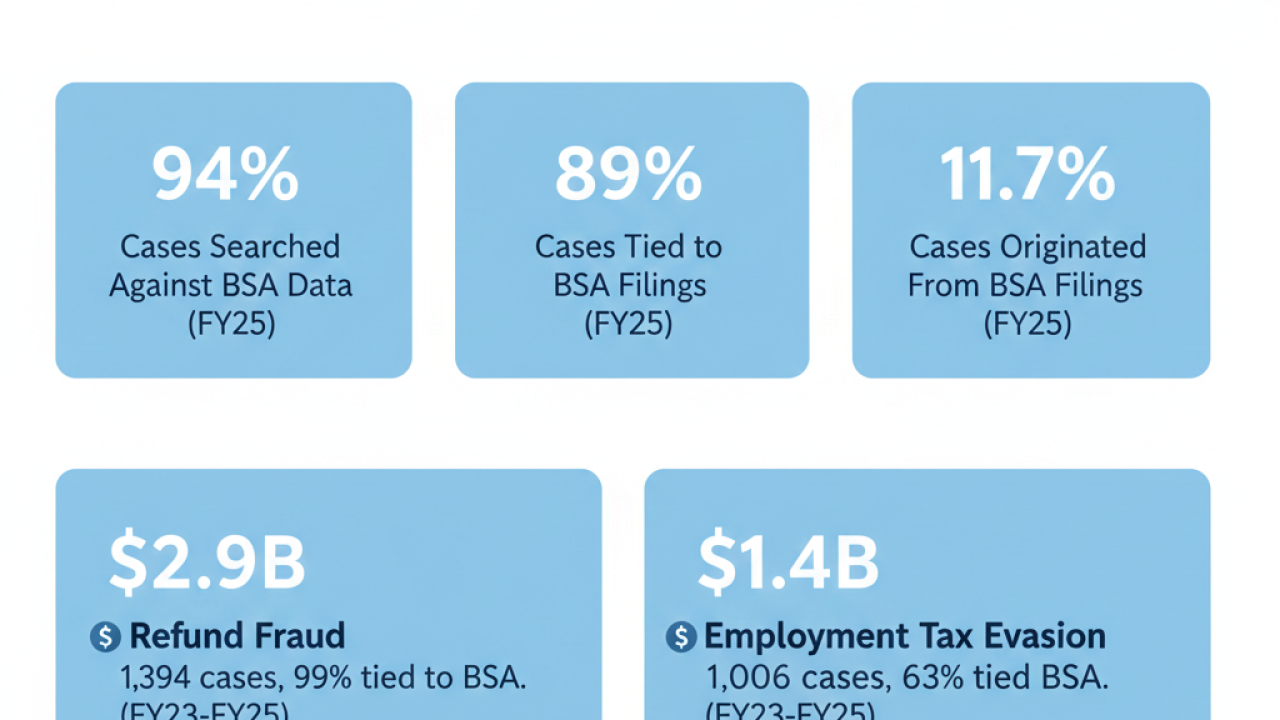Three years into the remote work revolution sparked by the COVID-19 pandemic, the accounting profession finds itself in the midst of a great natural experiment, as some firms seek to slow or reverse this change, while others seek to accelerate it.
While accounting's initial transition to remote work was seen as largely successful, according to a 2021 PwC report, the profession has seen something of a retrenchment, as many firms now implore their once-remote employees to return to the office for at least a hybrid schedule, if not fully on-site.
Jay Camper, senior director of recruiting, accounting and finance at LaSalle Network, said he's seen this firsthand. Around the beginning of last year, fully remote positions made up around 25% of the jobs being filled by the recruiting agency. Now, almost halfway through 2023, that has shrunk to roughly 5%. Much of this, he said, can be pinned on accounting leaders who weren't very happy about remote work in the first place.
"I think it is leaders who want their employees to create the culture they had pre-COVID. I think it's also about productivity levels. Don't get me wrong — there are people who can productively work remotely, but there are others who aren't able to handle that autonomy," he said.
Ritesh Patel, the practice lead for accounting and finance at recruiting firm Aston Carter, said he has seen a similar tapering off. In the last year and a half, he said, hybrid or fully in-person positions have been increasing while fully remote ones are decreasing. He cited similar reasons as Camper.
"Organizations are pushing a return to the office, especially major ones. … What we see is bigger companies with multiple work sites and multiple leases are rushing people back on site," he said.
Despite this, however, there are many who have leaned hard in the other direction and embraced remote work. In their world, the shift accounting experienced was no temporary blip but a profound revolution in the way the profession operated, and they're not willing to go back to the way things were.

Among the champions of the revolution is consultant Jennifer Wilson, the co-founder of ConvergenceCoaching, a fully remote consulting firm that advises accountants. The profession, she said, is starting to stabilize into something of a bell curve: those who are fully remote and fully in-office are both minorities compared to those who work hybrid schedules. While this does indicate that those in favor of fully in-person jobs have gained ground, they remain soundly outnumbered by those who work remotely at least a little bit. The question for many accountants today is not whether they telecommute, but how many days a week they do so.
Evidencing this conclusion is data from ConvergenceCoaching's annual "Anytime, Anywhere Work" Survey. Between 2020 and 2022, the number of surveyed accounting firms that said they allow their employees to work remotely from the location of their choosing on a regular and fluid basis went from 42% to 78%; conversely, the proportion of firms that said they allow people to work remote or hybrid schedules only on a case-by-case basis went from 53% to 17% in the same time period. Only 3% of respondents do not allow any remote work at all.
"COVID accelerated it, but we were already on our way [to more remote work]. But all the bleeding-edge firms before COVID, most of them jumped off the cliff and now they're hiring people all over the country and have maybe even reduced their physical footprint in some areas to bring costs down. Those firms really went whole hog," said Wilson.
The experiment
This divergence in attitudes is leading to the great natural experiment in the accounting industry, with some firms embracing remote work, others fleeing it, and most being somewhere in between. The ultimate results of this experiment remain to be seen, but it has already been affecting hiring patterns at certain accounting firms.
"People can work for organizations anywhere," said Wilson. "And we're in a free market economy, so why would they work for an organization in their backyard that won't pay them as much or offer them the right cultural fit or give them a position they're looking for? Why settle for the local company when they can attract those things from a remote company?" she said.
The survey noted that when firms do allow remote work, they are much more amenable to hiring someone outside their local geographic area. The percentage of firms with remote team members who have also hired full time remote workers outside their geographies went from 31% in 2020 to 81% in 2022, while the percentage of participating firms retaining a team member who relocated outside the practice's geographic areas jumped to 79%.
Wilson noted that, on the one hand, large city firms can reach out into suburban, exurban or rural areas to access new talent, which she noted has become far more important because it's becoming difficult to fill these positions in the first place. On the other hand, she has also seen smaller firms in those same suburban, exurban or rural areas hiring accountants from big cities, which has allowed them to access specialized talent not generally available in their areas, which then enables them to expand their service offerings.
Jeff Phillips, co-founder of accounting recruiting firm Accountingfly, observed that in the beginning, remote hires were more of local firms hiring staff from big cities. This was because the ones most likely to have embraced remote work back then were smaller practices on the cutting edge of technology, many of whom had advocated for telecommuting even before the pandemic. However, as time has gone on, he said larger firms have managed to adapt to the new reality and bring their considerable resources to bear on the labor pool. This has reversed the flow of talent in recent years.
"Now it's definitely the larger, more progressive firms, a lot of coastal firms in the West and East, who are hiring a lot of remote talent. I'm seeing a lot of large coastal firms who were already paying high wages going to Omaha, Nebraska, and poaching CPAs from the firms there, giving them a 25% pay bump and letting them work in their sweatpants. So we feel like this trend, though still underrepresented, has really blossomed in the profession," he said.
Daniel Aobdia, a Penn State accounting professor who has studied the labor market dynamics of auditors in public accounting firms, noted that this pattern is more likely to disadvantage local firms who, prior to the rise of remote work, wielded a great deal of market power for professionals in their area because they were among a finite supply of local employers.
"So, in other words, they can dictate more of the terms of employment when dealing with the local market. If anyone is going to give you one dollar less than the market price based on demand, you won't take this job, you'll go somewhere else. But when there is only a limited number of employers, they can dictate things like hours and wages. This happens more often when you have a local-type market," he said.
What remote work has done is at least partially transform the labor market into a national-scale one, where firms are not only competing with their regional rivals for talent, but with every other firm in the country willing to accommodate fully remote positions.
"That typically reduces their labor market power," he said. "That said, it also depends on what market we have in mind."
He noted that the accounting profession has its own particularities, including the fact that those who are trained in it don't necessarily have to work in public accounting firms. These are not the only types of companies looking for accountants. If a professional is not being offered a good rate and good working conditions in public accounting, they can turn to finance or even technology, which are quite willing to accommodate remote workers.
"What is interesting is not just what is happening in the public accounting profession and the Big Four, but also the other professions, because they are also getting more remote and therefore also hire within the [national-scale] market. That is going to broaden the substitution of people in this market who are interested in being auditors and as a result, if there is more substitution-type career poaching, that should decrease the labor market power that public accounting firms currently may be having in some local markets," Aobdia said.
Accountingfly's Phillips has seen this play out over the past few years. Even before the pandemic, the labor pool of qualified accountants had been shrinking due to fewer young people entering accounting programs at school, and to older professionals retiring and taking their institutional knowledge with them. This has led the already tight competition for accounting talent to grow even more intense, and those who embrace remote work right now seem to have the advantage. He spoke about a large firm in the Northeast where 75% of the audit staff is composed of professionals who've been poached from smaller firms in the Midwest.
"It's creating a competitive atmosphere where the progressive remote firms are poaching the talent, paying them more," he said.
Cui bono?
In particular, what this current era shows is that it is a very good time to be a specialist, as these are the people who seem to be the most likely to be recruited for a full-time remote position. Aston Carter's Patel said that those who are full-time remote working outside their home geographies tend to have highly sought-after technical skills, whether it's being able to shape and implement complex tax plans or having strong analytical skills for client advisory services. Those least likely to be working remote, he said, are those who are in more routine, operational roles.
"The higher you go on the food chain in terms of skill set, there are fewer qualified people who can do something. Someone who can do something very technical in financial reporting or tax, there aren't as many of those people. Their skill sets are more niche, and they're more nimble. Whereas [those who do] AP or AR, there's more abundance and so there's less flexibility," Patel said.
This type of setup generally tends to favor firms with more money, which tend to be larger and based in cities. However ConvergenceCoaching's Wilson said that this need not necessarily be the case. While small local firms might not be able to compete with large national firms on compensation, she has witnessed many other ways they can compete for talent, such as culture. Not everyone, she said, appreciates being emailed several times a week to be told that they have yet to complete their 55 to 60 mandatory billable hours, as might happen at a larger firm.
"There's always an opportunity to differentiate, and it's not just economic, there's also the opportunity to differentiate based on the feeling of the work, which is just as important as how much they pay me. And the feel of the place I want to work is different than the place you'd want to work. So it's very firm-specific and candidate-specific. … Firms grossly underestimate the competitive advantage they get from a culture of flexibility," she said.





